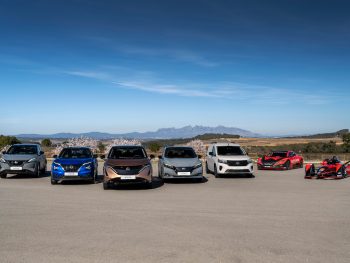Nissan has revealed its new six-part electrified line-up arriving this summer as it commits to ending investment in new pure internal combustion engines for passenger vehicles.

The brand has said it won’t be investing in Euro 7 for passenger cars and so will not introduce any new pure internal combustion engine-powered passenger cars in Europe from 2023.
Instead, it expects 75% of its sales mix in the region to be electrified by FY2026, with the ambition to reach 100% by the end of the decade – a key part of its Ambition 2030 long-term vision for mobility.
Guillaume Cartier, chairperson, Nissan Africa, Middle East, India, Europe and Oceania Region, outlined: “Nissan is charging towards an electrified future, with Europe leading the way. We have established a clear direction through Ambition 2030 and with our new electrified line-up we are truly paving the way to a sustainable future.”
The brand is looking to meet drivers’ mobility needs through a range of models with different levels of electrification and clear market differentiation thanks to Nissan technologies.
“Leveraging our global presence and Alliance partnerships, this is a landmark moment for Nissan in Europe with the arrival of our most comprehensive product offering to date. We have harnessed our disruptive nature and our electric expertise to deliver a suite of electrified powertrain technologies that meet the needs of our customers, with zero compromise on excitement,” added Cartier.
2022 marks a big milestone in the plans with the introduction of hybrid technology on Juke, e-Power on Qashqai and X-Trail and the arrival of the Ariya electric coupé crossover this summer. A refreshed version of the electric Nissan Leaf has also gone on sale this month, bringing new personalisation options and latest driver assistance tech.
The new Townstar electric compact LCV also reinforces plans – it’s being offered with both petrol and electric powertrains, the latter delivering 177 miles of range under the WLTP combined cycle.
Nissan is also working on a comprehensive EV Energy Ecosystem, which explores initiatives to optimise and expand battery energy management capabilities. This includes its flagship manufacturing ecosystem, EV36Zero, based in Sunderland, UK – brings together three interconnected initiatives, covering electric vehicles, renewable energy and battery production, and is intended to set a blueprint for the future of the automotive industry.

